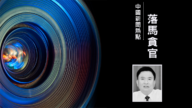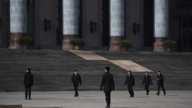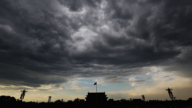【新唐人2013年12月14日讯】总部位于美国华盛顿的“全球金融诚信机构”(GFI),研究55个发展中国家有关“黑钱外流”的情况,结果显示:2002年至2011年,近十年期间,中国外流的“黑钱”,累计超过1万亿美元,约占全球总额的六分之一,位居世界“赃款外流”的榜首。而这些外流的黑钱,据了解,多是不义之财。
美国《新闻周刊》12月11号报导,“全球金融诚信机构”研究发现,2002年至2011年近10年间,55个发展中国家外流的黑钱,总额高达5万9000亿美元,其中中国为1万亿美元以上,约占黑钱外流总额的六分之一,位居榜首。
研究指出,黑钱流动往往与犯罪、贪污、贿赂、洗钱、回扣和逃税有关。最常使用的方法是在外汇单上造假,也就是在出口或进口中,漏报或多报产品的真正价值。10年进出口伪报货价的数额,大约占黑钱总额的8成。
“全球金融诚信机构”的总裁雷蒙德•贝克(Raymond Baker)强调:“我们或许都低估了中国与香港之间的问题,情况很糟糕。”
他表示,“国际货币基金”组织的贸易数据,范围仅限于商品贸易,而不包括服务贸易,因此很难确定中国和香港之间的黑钱流动问题,另外数据中还不包括穆斯林国家非正规银行系统现金流动的数据。
大陆经济学专家杨彬指出,中国外流的黑钱多是不义之财。
大陆经济学专家杨彬:“有钱的人跟高官跟富豪,连人带钱往外转移的特别多,这个是现状,另外的是国企的这种流失,大的企业国企跟他们做生意的,跟国外他有生意,这生意恐怕这里面都有黑钱在里面,以权谋私,国家亏了一个亿,你让国家亏十个亿,可以做到吧,然后这个钱流到国外了。”
11月下旬,《维基解密》曝光:中共官员在瑞士银行“UBS”有5,000多个人账户,而香港是高层官员洗钱的主要地点。中共每个派别都有自己的银行和操盘手。
日前遭中共司法调查的“石油帮”老大—-前中共政法委书记周永康,他被曝光的海外账户,仅在加拿大,就有2000万美元的存款。
而周永康的嫡系,9月刚落马的前中共国资委主任,“中石油”前董事长蒋洁敏,也被揭露利用油田收购、采购设备等重大项目,帮周的家族洗钱高达百亿美元,周家再转存瑞士、美国、加拿大等各国银行。
2002年12月9号,“国际清算银行”发布例行报告,报告中提出:“中资银行(一家或数家)转移了30多亿美元的资金,到它们位于加勒比海地区的分支机构。”
而“中国银行”只承认转移了30多亿美元中的10亿美元。那么,谁转移了剩下的20亿美元?
前“中国银行”香港副董事长兼总裁刘金宝,于2003年5月20号在深圳被捕。他披露,前中共党魁江泽民在2002年“十六大”之前,一次挪出200多亿人民币。
中国资深法学专家赵远明:“他这钱来路不正,而且很多好比高官都是收受贿赂这些钱,大批的钱都没有明确出处,那么他只好往国外汇,第一是保证这个钱不出问题,第二掩盖自己的受贿犯罪的这种事实。”
2011年“中国人民银行”曾公布一项机密调研结果:从上世纪90年代中期以来,中共外逃党政干部和失踪人员数目,高达16000至18000人,而他们携带外逃的款项达8000亿元人民币。
中国资深法学专家赵远明:“邓小平让一部分人先富起来,这一部分人就是太子党这类人,他们富因为他(们)不是靠自己的能力,而是靠权利。中国的富豪,真正的是靠自己的才华本事发起来,不是特别多。所以说,一旦中国政局不稳,或者是怎么样的政治运动一来,他们(贪官)就开始担心。”
中国资深法学专家赵远明指出,中共贪官和富豪对中共体制没信心,怕人财两空,他们把国外当作储存财产的“保险柜”,而把中国当作捞钱的“金矿”。
采访编辑/李韵 后制/李智远
China Tops Dirty Money Outflow
According to Global Financial Integrity, a Washington, D.C.-
based research organization, the study found that the total
amount of tainted money to have leached out of 55 developing
countries to be over $5.9 trillion between 2002 and 2011.
China tops the list, at just over $1 trillion, or nearly a
sixth of total global hemorrhaged assets,
to Russia’s cumulative $881 billion.
The outflowing cash is mostly associated
with illegal activities.
Newsweek reported on 11th December, according to GFI’s
study, the total amount of tainted money to have leached
out of 55 developing countries to be over $5.9 trillion
between 2002 and 2011.
China tops the list, at just over $1 trillion,
or nearly a sixth of total of global hemorrhaged assets.
Research indicated that the flow of tainted money, linked to
crime, corruption, bribery, money laundering,
kickbacks and tax evasion.
By far the biggest driver of tainted money is something
called trade misinvoicing — the underreporting or
overreporting of the true value of goods or
services sold or acquired abroad.
The misinvoicing accounted for nearly 80 percent of
illicit flows from 2002 through to 2011.
Raymond Baker, the president of GFI, told Newsweek:
We may well underestimate what’s going on between
China and Hong Kong — it’s murky.
Baker notes that IMF trade data covers misinvoicing only
for merchandise trade, not service trade, and that figuring
out illicit flows between China and Hong Kong is difficult.
GFI’s figures also do not account for hawala transactions,
an informal banking system common in Muslim countries.
Economist Yang Bin indicates the cash outflow
from China is mostly illegal.
Eeconomist, Yang Bin: It is common in China that those who
are wealthy and at the official rankings
transfer money overseas.
There are also outflows from the state owned enterprises (SOE).
Business with SOE (state owned enterprises) will mostly
involve tainted money.
They abuse the power to seek personal wealth.
If the state loses 100 million yuan, they can leave it as a loss of
ten times the amonout of 100 million yuan.
The difference in money can easily flow overseas.
In late November, Wikileaks reported that Chinese
government officials hold about 5,000 personal Swiss bank
accounts with the Swiss global financial services company UBS.
Hong Kong is a major place for top officials’
international money laundering.
Each faction of the Communist Party (CCP) has its
own bank and dealer.
The former chief of domestic security, Zhou Yongkang,
who is engulfed in a corruption scandal and investigations,
holds a $20 million bank account in Canada, Wikileaks claims.
Zhou Yongkang’s loyalist, Jiang Jiemin, former chairman of
PetroChina, was sacked in September.
He was also found to embezzle over $10 billion through
oil field acquisition and procurement of equipment and
launder the money into Zhou’s bank accounts in
Switzerland, USA, and Canada.
In a quarterly review by Bank for International Settlements
On 9th December, 2002, it was stated: in particular,
Chinese banks transferred over $3 billion to their own offices
in banking centers in the Caribbean.
The “Bank of China" recognized only transactions of just
$1 billion. so, what happened to the remaining $2 billion?
Liu Jinbao, former CEO of Bank of China (Hong Kong) and
vice-chairman of Bank of China, was arrested in Shenzhen
on 20th May, 2003.
He revealed that former CCP leader Jiang Zemin had removed
more than 20 billion RMB in 2002,
prior to the 16th National Congress.
Zhao Yuanming, specialist in legal studies:
None of the money was legal.
A majority of high ranking officials took bribes
from unknown sources.
They have to transfer the money overseas to ensure the money
is secured and to cover their crimes of bribery.
The People’s Bank of China has announced a confidential
survey result in 2011: Since the mid 1990s, there have been
between 16,000 and 18,000 officials and cadres missing
with a total of 800 billion RMB.
Zhao Yuanming, specialist in legal studies: Deng Xiaoping made
a claim to allow some people to get rich first.
Those people are the princelings.
They got rich not because of their abilities, but their power.
Not many tycoons in China gained their wealth through
their true capabilities.
That’s why any political instability or movement
will get them (corrupt officials) worried.
Legal expert Zhao Yuanming says that the corrupt officials
and the rich people in China have no confidence in the CCP.
They lack security for their lives and their money.
They have treated foreign countries as the “safe haven"
and China the “gold mine".
Interview & Edit/LiYun Post-Production/LiZhiyuan



























